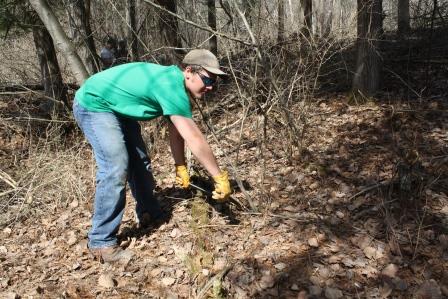
DUBOIS – Students in the Wildlife Technology program at Penn State DuBois are learning by doing while also making significant contributions to the environment through their work on an area reforestation project.
Assistant Professor of Forestry Aaron Stottlemyer and his students have teamed up with the Pennsylvania Department of Conservation and Natural Resources (DCNR) in order to bring new life back to a portion of reclaimed strip mine. The tract, in Washington Township, Jefferson County, is owned by the American Chestnut Foundation.
Stottlemyer explained a reforestation project as an ongoing, complex undertaking with many varied steps. Tree planting will take place, but site preparation is a crucial early step that students are now taking.
At this point, they are working to eradicate invasive plant species from the area, in order to promote the growth of native trees. An invasive species is one that is not native to an area, and is harmful to plants or animals that are native to that area. In this case, honeysuckle and autumn olive are the targets.
“We’re killing them because we want the forest to grow,” Stottlemyer said. “If these invasive plants were left to grow, they would drown out the trees.”
The group is pulling honeysuckle and autumn olive plants out by the roots where possible, or cutting them to the ground and treating the area with herbicide. The current focus is on a stand of aspen trees that are suffering due to the existence of the invasive plants.
Another step in promoting growth of the aspen stand is to actually cut some of the aspens down. The species of tree is known to regenerate quickly with multiple sprouts or “suckers” from a single stump.
“Hundreds of suckers will come up, and the forest will take off even faster,” Stottlemyer explained. He noted the value of the forest in the habitat and food source it will provide for multiple wildlife species, such as rabbits, grouse, turkey, and more.
Gary Gilmore, a service forester for DCNR, manages the property where this work takes place. He explained how crucial these efforts are, saying, “Forests are critical to our well-being, and you can’t get the benefits you need from them by simply letting them alone. Forest land must be managed, because if not, the invasive will eventually take over.”
For students who plan to embark on a career in environmental conservation, the experience is a valuable part of their education. Nate Wilson of Brookville is a freshman in the Wild Life Technology program.
He said, “It’s field experience; it’s hands-on. It enhances our education. We’re learning from people who already work in the field. Plus, it puts things in perspective for when I hear things back in the classroom.”
Wilson also said it’s gratifying to contribute to a lasting effort. He said, “Anything that benefits the environment is great. Being able to come back years from now and see how things progress will be my reward for it.”
Gilmore said the relationship between DCNR and Penn State DuBois has offered something positive for everyone involved.
“It’s a mutually beneficial relationship,” he said. “It gives students the opportunity to actually do forest management, to interact with professionals, and to really see what it takes to practice forest management.
“The students are the workers. They can put words on the ground; put the ideas in place by doing the physical work of preparing sites, removing invasive, planting trees.”